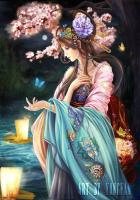A very little experience enables the traveller to distinguish between the two. Both of them have the well-known characteristics of the Northern Asiatic--the broad flat face, yellow skin, small, obliquely set eyes, high cheekbones, thin, straggling beard; but these traits are more strongly marked, more exaggerated, if we may use such an expression, in the Mongol than in the Tartar. Thus the Mongol is, according to our conceptions, by far the uglier of the two, and the man of Tartar race, when seen beside him, appears almost European by comparison. The distinction is confirmed by a study of their languages. All the Tartar languages are closely allied, so that a person of average linguistic talent who has mastered one of them, whether it be the rude Turki of Central Asia or the highly polished Turkish of Stambul, can easily acquire any of the others; whereas even an extensive acquaintance with the Tartar dialects will be of no practical use to him in learning a language of the Mongol group. In their religions likewise the two races differ. The Mongols are as a rule Shamanists or Buddhists, while the Tartars are Mahometans. Some of the Mongol invaders, it is true, adopted Mahometanism from the conquered Tartar tribes, and by this change of religion, which led naturally to intermarriage, their descendants became gradually blended with the older population; but the broad line of distinction was not permanently effaced.
It is often supposed, even by people who profess to be acquainted with Russian history, that Mongols and Tartars alike first came westward to the frontiers of Europe with Genghis Khan. This is true of the Mongols, but so far as the Tartars are concerned it is an entire mistake. From time immemorial the Tartar tribes roamed over these territories. Like the Russians, they were conquered by the Mongol invaders and had long to pay tribute, and when the Mongol empire crumbled to pieces by internal dissensions and finally disappeared before the victorious advance of the Russians, the Tartars reappeared from the confusion without having lost, notwithstanding an intermixture doubtless of Mongol blood, their old racial characteristics, their old dialects, and their old tribal organisation.
The germ of the vast horde which swept over Asia and advanced into the centre of Europe was a small pastoral tribe of Mongols living in the hilly country to the north of China, near the sources of the Amur. This tribe was neither more warlike nor more formidable than its neighbours till near the close of the twelfth century, when there appeared in it a man who is described as "a mighty hunter before the Lord." Of him and his people we have a brief description by a Chinese author of the time: "A man of gigantic stature, with broad forehead and long beard, and remarkable for his bravery. As to his people, their faces are broad, flat, and four-
cornered, with prominent cheek-bones; their eyes have no upper eyelashes; they have very little hair in their beards and moustaches; their exterior is very repulsive." This man of gigantic stature was no other than Genghis Khan. He began by subduing and incorporating into his army the surrounding tribes, conquered with their assistance a great part of Northern China, and then, leaving one of his generals to complete the conquest of the Celestial Empire, he led his army westward with the ambitious design of conquering the whole world. "As there is but one God in heaven," he was wont to say, "so there should be but one ruler on earth"; and this one universal ruler he himself aspired to be.
A European army necessarily diminishes in force and its existence becomes more and more imperilled as it advances from its base of operations into a foreign and hostile country. Not so a horde like that of Genghis Khan in a country such as that which it had to traverse. It needed no base of operations, for it took with it its flocks, its tents, and all its worldly goods. Properly speaking, it was not an army at all, but rather a people in movement. The grassy Steppes fed the flocks, and the flocks fed the warriors; and with such a simple commissariat system there was no necessity for keeping up communications with the point of departure. Instead of diminishing in numbers, the horde constantly increased as it moved forwards. The nomadic tribes which it encountered on its way, composed of men who found a home wherever they found pasture and drinking-water, required little persuasion to make them join the onward movement. By means of this terrible instrument of conquest Genghis succeeded in creating a colossal Empire, stretching from the Carpathians to the eastern shores of Asia, and from the Arctic Ocean to the Himalayas.
Genghis was no mere ruthless destroyer; he was at the same time one of the greatest administrators the world has ever seen. But his administrative genius could not work miracles. His vast Empire, founded on conquest and composed of the most heterogeneous elements, had no principle of organic life in it, and could not possibly be long-lived. It had been created by him, and it perished with him. For some time after his death the dignity of Grand Khan was held by some one of his descendants, and the centralised administration was nominally preserved; but the local rulers rapidly emancipated themselves from the central authority, and within half a century after the death of its founder the great Mongol Empire was little more than "a geographical expression."















